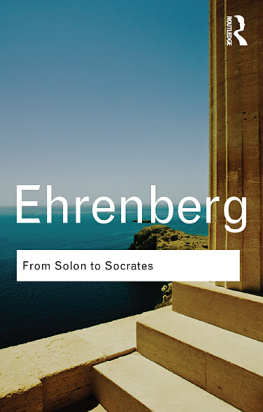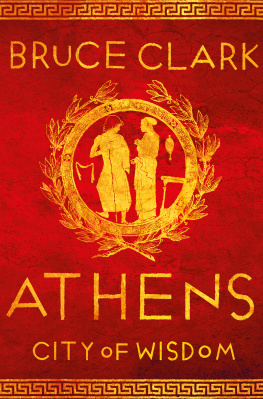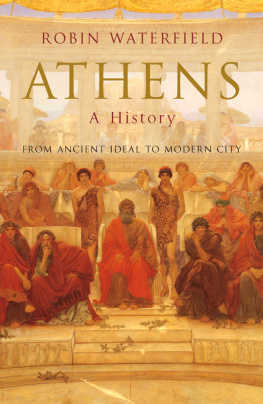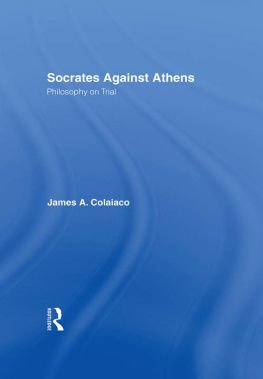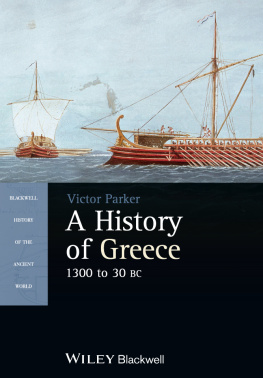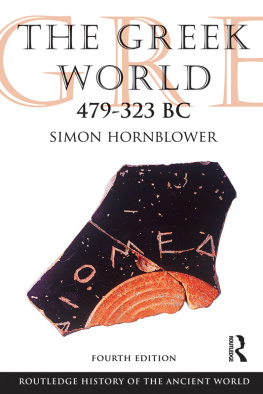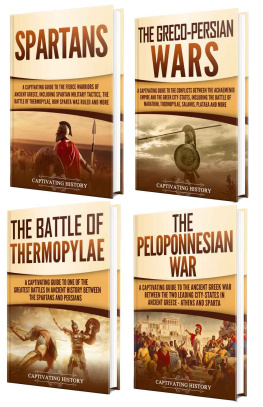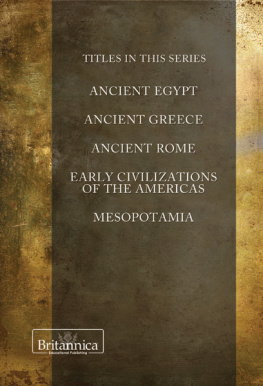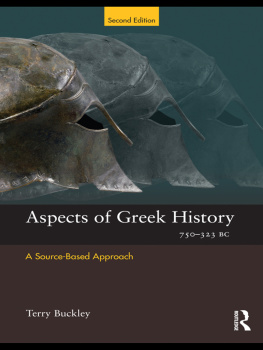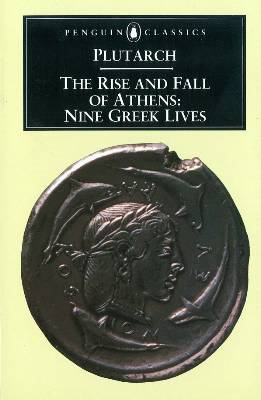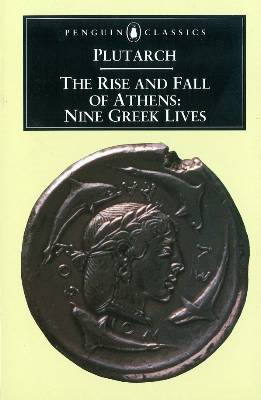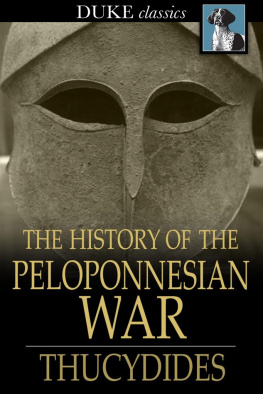From Solon to Socrates
Dr. Ehrenbergs mastery of ancient sources and modern scholarship is beyond cavil: nothing seems to escape this vigilant eye. Scarcely a page, moreover, fails to provide some illuminating comment on Greek life and letters, the fruit of a lifetimes study and reflection.
The Times Literary Supplement
Routledge Classics contains the very best of Routledge publishing over the past century or so, books that have, by popular consent, become established as classics in their field. Drawing on a fantastic heritage of innovative writing published by Routledge and its associated imprints, this series makes available in attractive, affordable form some of the most important works of modern times.
For a complete list of titles visit
www.routledge.com/classics
Victor Ehrenberg
From Solon to Socrates Greek history and civilization during the 6th and 5th centuries B.C.
With a new foreword by Paul Millett

London and New York
First published 1968 by Methuen & Co.
First published in Routledge Classics 2011
by Routledge
2 Park Square, Milton Park, Abingdon, Oxon OX14 4RN
Simultaneously published in the USA and Canada
by Routledge
270 Madison Avenue, New York, NY 10016
Routledge is an imprint of the Taylor & Francis Group, an informa business
This edition published in the Taylor & Francis e-Library, 2010.
To purchase your own copy of this or any of Taylor & Francis or Routledges collection of thousands of eBooks please go to www.eBookstore.tandf.co.uk.
1967, 1973 Victor Ehrenberg
Foreword 2011 Paul Millett
All rights reserved. No part of this book may be reprinted
or reproduced or utilised in any form or by any electronic,
mechanical, or other means, now known or hereafter
invented, including photocopying and recording, or in
any information storage or retrieval system, without
permission in writing from the publishers.
British Library Cataloguing in Publication Data
A catalogue record for this book is available from the British Library
Library of Congress Cataloging in Publication Data
A catalog record for this book has been requested
ISBN 0-203-84477-7 Master e-book ISBN
ISBN10: 0-415-58487-6 (pbk)
ISBN10: 0-203-84477-7 (ebk)
ISBN13: 978-0-415-58487-6 (pbk)
ISBN13: 978-0-203-84477-9 (ebk)
to the memory of
Madge Webster
(A. M. Dale)
and
A. H. M. Jones
MAPS
Greece and the Aegean |
Laconia |
Attica and Surroundings |
Cleisthenes Division of Attica |
Sicily and South Italy |
Battle of Marathon |
Battle of Salamis |
Athens and her Harbours |
Pylos and Sphacteria |
Syracuse |
ABBREVIATIONS
AP | Aristotle, Athenaion Politeia |
ASAI | Ancient Society and Institutions. Studies presented to V. Ehrenberg (Oxford 1966) |
ATL | The Athenian Tribute Lists, ed. B. D. Meritt, H. T. Wade-Gery, M. F. M. Gregor. 4 vols. Cambridge, Mass. 193953 |
BICS | Bulletin of the Institute of Classical Studies |
CAH | Cambridge Ancient History |
CHJ | Cambridge Historical Journal |
D | Anthologia Lyrica, ed. E. Diehl |
DK | H. Diels and W. Kranz, Die Fragmente der Vorsokratiker (Berlin 19345, 19526) |
DSDA | H. Bengston, Die Staatsvertrge des Altertums, vol. 2 (Munich 1962) |
FGrH | F. Jacoby, Fragmente der griechischen Historiker (Berlin 1929. Leiden 195457) |
Gomme | A. W. Gomme, Historical Commentary on Thucydides, vols. 13 (Oxford 194556), vol. 4 (ed. A. Andrewes and K. J. Dover), Oxford 1970 |
GRBS | Greek, Roman and Byzantine Studies |
Hdt. | Herodotus |
Hill3 | G. F. Hill, Sources for Greek History 478451, new ed. by R. Meiggs and A. Andrewes (Oxford 1951) |
HSt | Harvard Studies in Classical Philology |
HZ | Historische Zeitschrift |
ML | R. Meiggs and D. Lewis, A Selection of Greek Historical Inscriptions to the End of the 5th century B.C. (Oxford 1969) |
NumChr. | Numismatic Chronicle |
P | Poetae Melici Graeci, ed. D. L. Page (Oxford 1962) |
PI | Victor Ehrenberg, Polis und Imperium (Zurich 1965) |
RE | Pauly-Wissowa-Kroll, Real- Encyclopaedie f. d. klass. Altertumswissenschaft |
SB | Sitzungsberichte |
SEG | Supplementum Epigraphicum Graecum |
Tod | M. N. Tod, Greek Historical Inscriptions I2, II (Oxford 1946, 1948) |
PREFACE TO THE FIRST EDITION
In this book I am dealing with a period which has often been covered and is generally regarded as the most important in Greek history. That alone would not justify another attempt. Apart from the fact that there have been new discoveries, archaeological and otherwise, that could not have been dealt with in earlier works, I had two reasons of my own, or rather two aims, in undertaking to write this book. The first was to show the unity of Greek history in every phase, a unity of political, economic, religious, and cultural aspects. Even though in my view political, military, and social history must be the framework, indeed the centre, of any general history, it ought to be shown that this cannot be separated from the world of the mind. In all, however, that I have to say on works of literature, philosophy, science, or art, I beg to point out that I am not writing as an expert on any of these subjects, nor indeed do I attempt to cover the whole ground, but only to show the multifarious picture of Greek life at any given moment. It goes without saying that a severe, and perhaps not always fair, selection is inevitable. I make no apologies for things left out.
The other aim was, not simply to give a narrative, but to reveal the uncertainties of modern scholarship on many important questions; it ought to be clear that a mere enumeration of (alleged) facts is misleading. Thus, the book is not a general textbook, though it may still show traces of that earlier plan, and I hope that it will be useful for the younger student of history no less than for the scholar.
Writing today on even comparatively well-known periods of ancient history is, in fact, like entering a jungle a jungle of ancient traditions and modern conjectures, with very few undisputed facts. We have long ago lost the beautiful innocence of those whose love for Greece was combined with an unperturbed belief in the truth of at least the chief traditions of the Greeks themselves. We may be less critical than our immediate predecessors in our search for absolute historical truth, not least because we no longer believe in the possibility of discovering that truth. We are a generation in between, no longer sure of critical positivism, nor, on the other hand, of the rationalist intuition now so much in vogue. I myself cannot claim that my love for the ancient Greeks has found a safe route through the jungle, much as I have tried.

